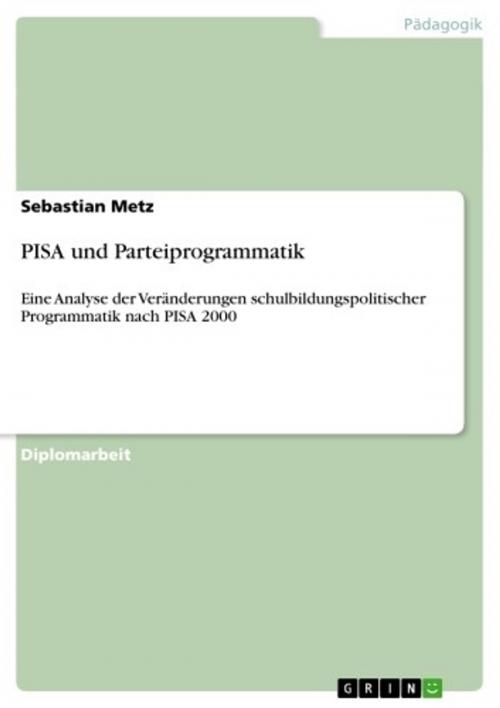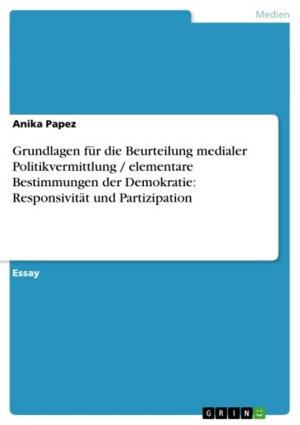PISA und Parteiprogrammatik
Eine Analyse der Veränderungen schulbildungspolitischer Programmatik nach PISA 2000
Nonfiction, Reference & Language, Education & Teaching, Administration| Author: | Sebastian Metz | ISBN: | 9783640513932 |
| Publisher: | GRIN Verlag | Publication: | January 16, 2010 |
| Imprint: | GRIN Verlag | Language: | German |
| Author: | Sebastian Metz |
| ISBN: | 9783640513932 |
| Publisher: | GRIN Verlag |
| Publication: | January 16, 2010 |
| Imprint: | GRIN Verlag |
| Language: | German |
Diplomarbeit aus dem Jahr 2009 im Fachbereich Pädagogik - Schulwesen, Bildungs- u. Schulpolitik, Note: 1,3, Universität Konstanz, Sprache: Deutsch, Abstract: Abstract The results of the international student assessment study PISA 2000 have uncovered serious shortcomings of the German school system and evoked a great public response. Since then numerous scientific publications have dealt with the PISA study and its implications. But one aspect so far has found little consideration: the programmatical processing of the PISA shock by the political parties. The present thesis picks up this scientific desideratum and analyses how the programmatical profiles in the area of school policy of the two Volksparteien CDU and SPD have changed since the first PISA study. Furthermore it will be examined which of those in the course of PISA thematized proposals for reform have been programmaticaly seized by the parties. At last it will be studied, if in the aftermath of the PISA shock there has been a greater programmatical convergency or divergency of the parties. To handle these questions, the state election manifestos (Landtagswahlprogramme) from CDU and SPD of all the german federal states of the last elections before and the first elections after PISA are analyzed with the method of content analysis. On the basis of the empirical results it can be shown, that the school political profiles of the two partys have changed in content as well as in their fields of attention. Thus there has been spotted the appearance of new topics such as early childhood education and also the emphasizing of certain aspects, for instance the expansion of full-time schools. From the mainly thematized proposals for the improvement of the German school system, it seems that the majority has been picked up by the parties. In this context it attracts attention that the claims for special measures to reduce educational disadvantages of kids and youths are hardly taken into account by the parties. Concerning the differences in the school political profiles of the Christian and Social Democrats, party-specific beliefs and approaches still exist. However the partys` answers to the challenges highlighted by the PISA-study are, barring the issue of the school structure, quite similar to each other. Moreover, after PISA 2000 an approximation in the importance which the partys attach to the individual school political aspects can be stated. Therewith the findings indicate a convergency of the school political profiles of CDU and SPD after PISA.
Diplomarbeit aus dem Jahr 2009 im Fachbereich Pädagogik - Schulwesen, Bildungs- u. Schulpolitik, Note: 1,3, Universität Konstanz, Sprache: Deutsch, Abstract: Abstract The results of the international student assessment study PISA 2000 have uncovered serious shortcomings of the German school system and evoked a great public response. Since then numerous scientific publications have dealt with the PISA study and its implications. But one aspect so far has found little consideration: the programmatical processing of the PISA shock by the political parties. The present thesis picks up this scientific desideratum and analyses how the programmatical profiles in the area of school policy of the two Volksparteien CDU and SPD have changed since the first PISA study. Furthermore it will be examined which of those in the course of PISA thematized proposals for reform have been programmaticaly seized by the parties. At last it will be studied, if in the aftermath of the PISA shock there has been a greater programmatical convergency or divergency of the parties. To handle these questions, the state election manifestos (Landtagswahlprogramme) from CDU and SPD of all the german federal states of the last elections before and the first elections after PISA are analyzed with the method of content analysis. On the basis of the empirical results it can be shown, that the school political profiles of the two partys have changed in content as well as in their fields of attention. Thus there has been spotted the appearance of new topics such as early childhood education and also the emphasizing of certain aspects, for instance the expansion of full-time schools. From the mainly thematized proposals for the improvement of the German school system, it seems that the majority has been picked up by the parties. In this context it attracts attention that the claims for special measures to reduce educational disadvantages of kids and youths are hardly taken into account by the parties. Concerning the differences in the school political profiles of the Christian and Social Democrats, party-specific beliefs and approaches still exist. However the partys` answers to the challenges highlighted by the PISA-study are, barring the issue of the school structure, quite similar to each other. Moreover, after PISA 2000 an approximation in the importance which the partys attach to the individual school political aspects can be stated. Therewith the findings indicate a convergency of the school political profiles of CDU and SPD after PISA.















